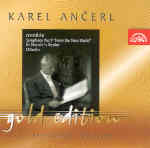This is one of the great “New World” Symphony recordings, an account as fiery and passionate as we have any right to expect. Karel Ancerl views the work (with reason) as a tragic piece and wastes no time making this clear. The first-movement development section and coda, and most particularly that huge climax in the finale where the opening chords of the second movement return over pounding timpani, have devastating force and impact. Ancerl shapes the Largo with artless skill, and he adopts a slower than usual tempo for the trio of the scherzo, no doubt for the extra rhythmic clarity he gains (check out the precisely played sextuplets in the triangle in the trio’s second half), not to mention the bold contrast with the trenchant outer sections. The two overtures make a fine bonus, with Othello in particular given a tensely dramatic reading–and it’s all spectacularly well played with the sort of proprietary pride we have come to expect from the Czech Philharmonic in this music. Finally, Supraphon’s careful remastering puts the music across more vividly than ever before. A classic.
































